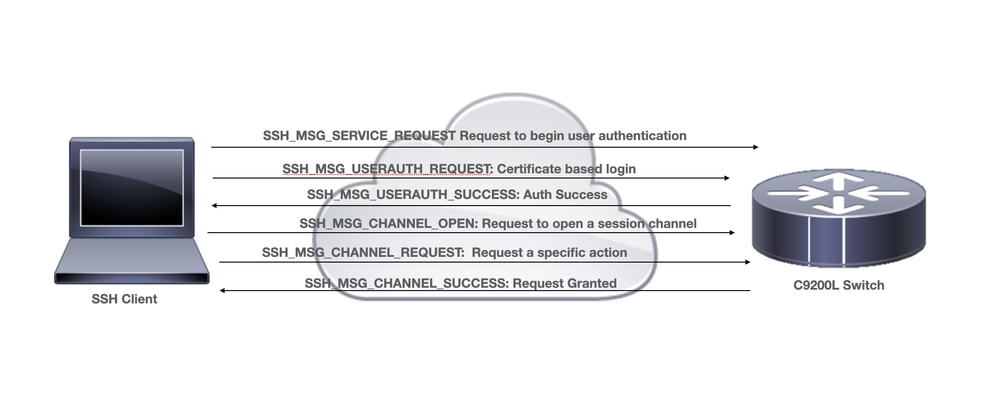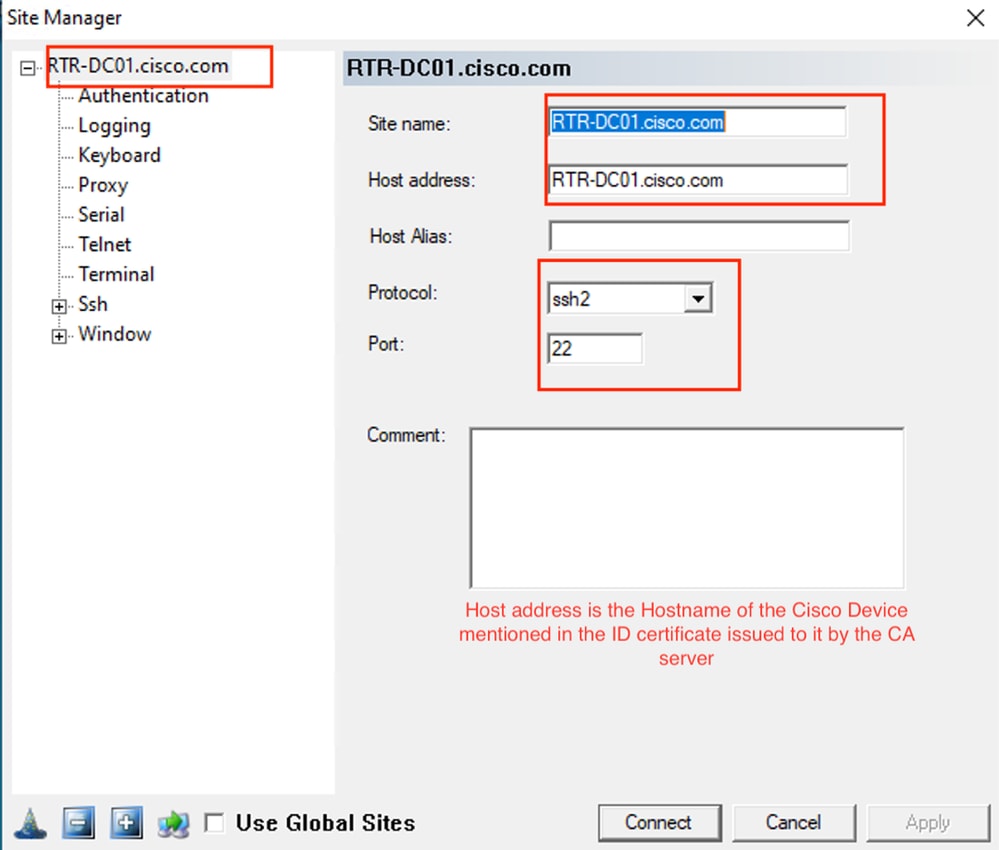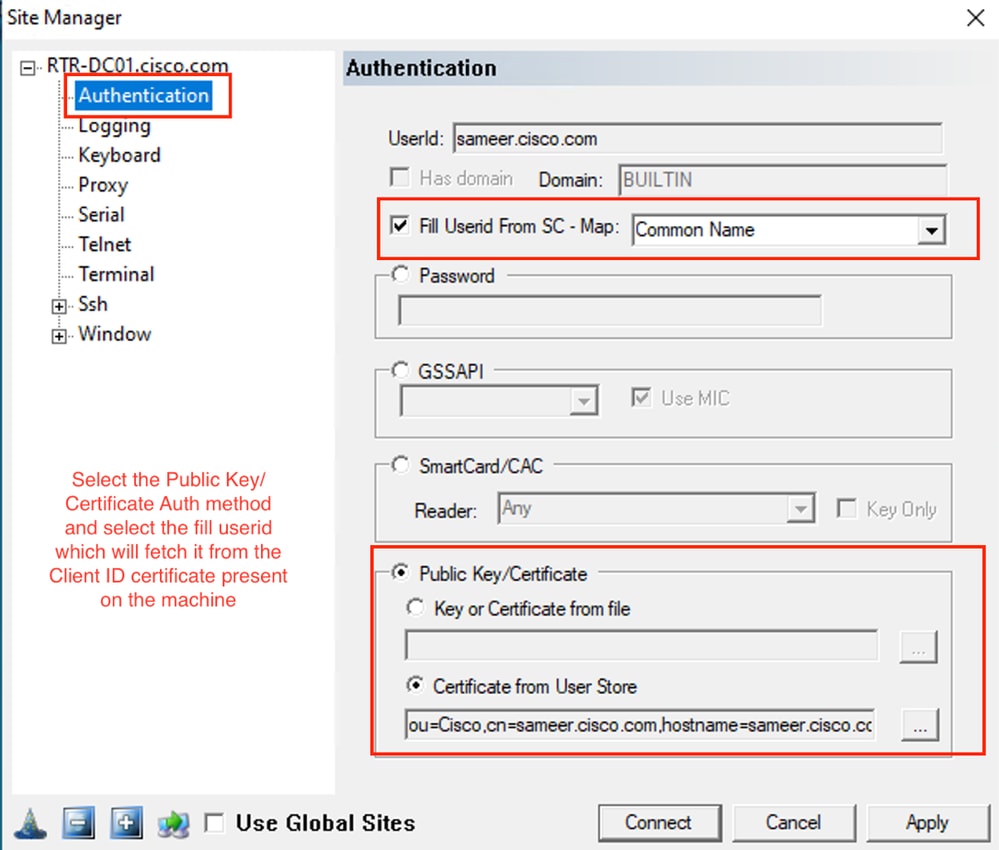Konfigurieren der Zertifikatsauthentifizierung für SSH auf Cisco IOS XE-Geräten
Download-Optionen
-
ePub (670.7 KB)
In verschiedenen Apps auf iPhone, iPad, Android, Sony Reader oder Windows Phone anzeigen
Inklusive Sprache
In dem Dokumentationssatz für dieses Produkt wird die Verwendung inklusiver Sprache angestrebt. Für die Zwecke dieses Dokumentationssatzes wird Sprache als „inklusiv“ verstanden, wenn sie keine Diskriminierung aufgrund von Alter, körperlicher und/oder geistiger Behinderung, Geschlechtszugehörigkeit und -identität, ethnischer Identität, sexueller Orientierung, sozioökonomischem Status und Intersektionalität impliziert. Dennoch können in der Dokumentation stilistische Abweichungen von diesem Bemühen auftreten, wenn Text verwendet wird, der in Benutzeroberflächen der Produktsoftware fest codiert ist, auf RFP-Dokumentation basiert oder von einem genannten Drittanbieterprodukt verwendet wird. Hier erfahren Sie mehr darüber, wie Cisco inklusive Sprache verwendet.
Informationen zu dieser Übersetzung
Cisco hat dieses Dokument maschinell übersetzen und von einem menschlichen Übersetzer editieren und korrigieren lassen, um unseren Benutzern auf der ganzen Welt Support-Inhalte in ihrer eigenen Sprache zu bieten. Bitte beachten Sie, dass selbst die beste maschinelle Übersetzung nicht so genau ist wie eine von einem professionellen Übersetzer angefertigte. Cisco Systems, Inc. übernimmt keine Haftung für die Richtigkeit dieser Übersetzungen und empfiehlt, immer das englische Originaldokument (siehe bereitgestellter Link) heranzuziehen.
Inhalt
Einleitung
In diesem Dokument wird die Konfiguration von Secure Shell (SSH) auf Cisco IOS® XE-Geräten beschrieben, die X.509v3-Zertifikate für die Authentifizierung gemäß den in RFC 6187 definierten Richtlinien verwenden.
Voraussetzungen
Anforderungen
Cisco empfiehlt, dass Sie über Kenntnisse der Public Key Infrastructure (PKI)-Infrastruktur verfügen.
Verwendete Komponenten
Die Informationen in diesem Dokument basierend auf folgenden Software- und Hardware-Versionen:
- C9200L-Switch mit Cisco IOS XE Version 17.3.5
- Pragma Fortress SSH-Client
Die Informationen in diesem Dokument beziehen sich auf Geräte in einer speziell eingerichteten Testumgebung. Alle Geräte, die in diesem Dokument benutzt wurden, begannen mit einer gelöschten (Nichterfüllungs) Konfiguration. Wenn Ihr Netzwerk in Betrieb ist, stellen Sie sicher, dass Sie die möglichen Auswirkungen aller Befehle kennen
Hintergrundinformationen
Der Ansatz verbessert die SSH-Sicherheit durch die Aktivierung zertifikatbasierter Authentifizierung, wodurch die SSH-Schlüsselverwaltungsverfahren besser an die Verfahren für Transport Layer Security (TLS) angepasst werden.
SSH bietet gegenseitige Authentifizierung, um eine sichere Verbindung zwischen Client und Server herzustellen. Bisher wurden Server mit Rivest-Shamir-Addleman (RSA)-Schlüsselpaaren authentifiziert. Der Client berechnet einen Fingerabdruck des öffentlichen Schlüssels des Servers und fordert den Administrator auf, diesen zu überprüfen - idealerweise durch Vergleich mit einem bekannten Wert, der über eine sichere Out-of-Band-Methode ermittelt wurde. Diese manuelle Verifizierung wird jedoch aufgrund der Komplexität häufig übersprungen, wodurch das Risiko von Man-in-the-Middle-Angriffen (MitM) steigt und das SSH-Vertrauensmodell geschwächt wird.
RFC 6187 behebt diese Probleme durch die Aktivierung der X.509v3-zertifikatbasierten Authentifizierung, die SSH mit PKI integriert. Dieser Ansatz erhöht die Sicherheit und Skalierbarkeit, da die Vertrauensstellung über vertrauenswürdige Zertifizierungsstellen (Certificate Authorities, CAs) hergestellt werden kann. Diese stellen eine ähnliche Benutzererfahrung und ein ähnliches Vertrauensmodell wie TLS bereit.
Konfigurieren
Netzwerkdiagramm

Überlegungen zur Bereitstellung
- Zur Nutzung dieser Funktion ist ein RFC6187-kompatibler SSH-Client erforderlich.
- Der SSH-Client und -Server verhandelt unterstützte Authentifizierungsmechanismen. Alle Authentifizierungsmechanismen, die zuvor auf dem Gerät unterstützt wurden, können weiterhin gleichzeitig mit x509-basierten Authentifizierungsmechanismen ausgeführt werden, um einen reibungslosen Übergang zu gewährleisten.
- Der Administrator kann die x509-basierte Authentifizierungsmethode nur für den Server, nur für den Client oder für beide verwenden.
- Um die Authentifizierungsdaten des anderen Teilnehmers erfolgreich zu überprüfen, müssen Client und Server nur einer gemeinsamen Zertifizierungsstelle vertrauen. Das bedeutet, dass nur das Zertifikat der Zertifizierungsstelle, die das Routerzertifikat signiert hat, auf dem vertrauenswürdigen Zertifikatspeicher des Clientgeräts installiert werden muss.
- Das Zertifikat liefert Informationen über die Identität der anderen Partei (Common Name und Subject Alternative Name werden in der Regel für diesen Zweck verwendet). Der Client muss den Hostnamen oder den IP-Adressnamen des Servers, der als Eingabe durch den Administrator bereitgestellt wurde, mit den im vorgelegten Zertifikat verfügbaren Identitätsdaten vergleichen. Sie schränkt die Möglichkeiten von MitM- oder anderen Identitätswechsel-Angriffen stark ein.
Konfigurationen
IOS-XE-Gerät (SSH-Server)
Konfigurieren Sie einen Vertrauenspunkt, der das CA-Zertifikat und optional das Router-Zertifikat enthält.
crypto pki trustpoint pki-server
enrollment pkcs12
subject-name cn=RTR-DC01.cisco.com
revocation-check none
rsakeypair ssh-cert
! The username has to be fetched from the certificate for accounting and authorization purposes. Multiple options are available.
authorization username subjectname commonnameKonfigurieren der zulässigen Authentifizierungsmechanismen, die während der SSH-Tunnelaushandlung verwendet werden
! Alorithms used to authenticate server
ip ssh server algorithm hostkey x509v3-ssh-rsa ssh-rsa
! Acceptable algorithms used to authenticate the client
ip ssh server algorithm authentication publickey password keyboard
! Acceptable pubkey-based algorithms used to authenticate the client
ip ssh server algorithm publickey x509v3-ssh-rsa ssh-rsa
Konfigurieren Sie den SSH-Server, um die richtigen Zertifikate für den Authentifizierungsprozess zu verwenden.
ip ssh server certificate profile
server
trustpoint sign
user
trustpoint verify

Anmerkung: Stellen Sie sicher, dass der SSH-Server und der SSH-Client über das ID-Zertifikat verfügen, das vom gleichen Zertifizierungsstellenserver ausgestellt wurde.

Anmerkung: Wenn ein SSH-Client, z. B. ein Windows-Computer, über ein ID-Zertifikat verfügt, das von einer anderen Zertifizierungsstelle ausgestellt wurde, lassen Sie es auf dem SSH-Server, d. h. dem Cisco Switch, importieren, und ordnen Sie diesen Trustpoint dem oben unter dem Benutzerabschnitt aufgeführten SSH-Serverzertifikatprofil zu.
Pragma Fortress CL (SSH-Client auf Benutzergerät installiert)


Überprüfung
show ip ssh
SSH Enabled - version 1.99
Authentication methods:publickey,password,keyboard-interactive
Authentication Publickey Algorithms:x509v3-ssh-rsa,ssh-rsa
Hostkey Algorithms:x509v3-ssh-rsa,ssh-rsa
--- output truncated ----
show users
Line User Host(s) Idle Location
1 vty 0 sameer.cisco.com idle 00:02:37 192.168.1.100
Fehlerbehebung
Diese Debug-Protokolle werden verwendet, um eine erfolgreiche Sitzung nachzuverfolgen:
debug ip ssh detail
debug crypto pki transactions
debug crypto pki messages
debug crypto pki validation
Mar 27 15:35:40.103: SSH1: starting SSH control process
! Server identifies itself
Mar 27 15:35:40.103: SSH1: sent protocol version id SSH-1.99-Cisco-1.25
! Client identifies itself
Mar 27 15:35:40.106: SSH1: protocol version id is - SSH-2.0-Pragma FortressCL 5.0.10.4176
! Authentication algorithms supported by server
Mar 27 15:35:40.106: SSH2 1: kexinit sent: kex algo = diffie-hellman-group-exchange-sha1,diffie-hellman-group14-sha1
Mar 27 15:35:40.106: SSH2 1: kexinit sent: hostkey algo = x509v3-ssh-rsa,ssh-rsa
Mar 27 15:35:40.106: SSH2 1: kexinit sent: encryption algo = aes128-ctr,aes192-ctr,aes256-ctr
Mar 27 15:35:40.106: SSH2 1: kexinit sent: mac algo = hmac-sha2-256,hmac-sha2-512,hmac-sha1,hmac-sha1-96
Mar 27 15:35:40.106: SSH2 1: SSH2_MSG_KEXINIT sent
Mar 27 15:35:40.109: SSH2 1: SSH2_MSG_KEXINIT received
Mar 27 15:35:40.109: SSH2 1: kex: client->server enc:aes256-ctr mac:hmac-sha2-256
Mar 27 15:35:40.109: SSH2 1: kex: server->client enc:aes256-ctr mac:hmac-sha2-256
! Client chooses authentication algorithm
Mar 27 15:35:40.109: SSH2 1: Using hostkey algo = x509v3-ssh-rsa
Mar 27 15:35:40.109: SSH2 1: Using kex_algo = diffie-hellman-group-exchange-sha1
Mar 27 15:35:40.109: SSH2 1: SSH2_MSG_KEX_DH_GEX_REQUEST received
Mar 27 15:35:40.109: SSH2 1: Range sent by client is - 1024 < 2048 < 8192
Mar 27 15:35:40.109: SSH2 1: Modulus size established : 2048 bits
Mar 27 15:35:40.121: SSH2 1: expecting SSH2_MSG_KEX_DH_GEX_INIT
Mar 27 15:35:40.121: SSH2 1: SSH2_MSG_KEXDH_INIT received
! SSH Server sends certificate associated with trustpoint "pki-server"
Mar 27 15:35:40.133: SSH2 1: Sending Server certificate associated with PKI trustpoint "pki-server"
Mar 27 15:35:40.133: SSH2 1: Got 2 certificate(s) on certificate chain
Mar 27 15:35:40.135: SSH2: kex_derive_keys complete
Mar 27 15:35:40.135: SSH2 1: SSH2_MSG_NEWKEYS sent
Mar 27 15:35:40.135: SSH2 1: waiting for SSH2_MSG_NEWKEYS
Mar 27 15:35:40.214: SSH2 0: channel window adjust message received 49926
Mar 27 15:35:41.417: SSH2 1: SSH2_MSG_NEWKEYS received
Mar 27 15:35:41.436: SSH2 1: Authentications that can continue = publickey,password,keyboard-interactive
Mar 27 15:35:41.437: SSH2 1: Using method = none
Mar 27 15:35:41.437: SSH2 1: Authentications that can continue = publickey,password,keyboard-interactive
Mar 27 15:35:41.438: SSH2 1: Using method = publickey
! Client sends certificate
Mar 27 15:35:41.438: SSH2 1: Received publickey algo = x509v3-ssh-rsa
Mar 27 15:35:41.438: SSH2 1: Verifying certificate for user 'sameer.cisco.com' in SSH2_MSG_USERAUTH_REQUEST
Mar 27 15:35:41.439: SSH2 1: Verifying certificate for user 'sameer.cisco.com'
Mar 27 15:35:41.439: SSH2 1: Received a chain of 2 certificate
Mar 27 15:35:41.439: SSH2 1: Received 0 ocsp-response
Mar 27 15:35:41.439: SSH2 1: Starting PKI session for certificate verification
! Client certificate is verified by the SSH-Server
Mar 27 15:35:41.444: SSH2 1: Verifying certificate for user 'sameer.cisco.com'
Mar 27 15:35:41.444: SSH2 1: Received a chain of 2 certificate
Mar 27 15:35:41.444: SSH2 1: Received 0 ocsp-response
Mar 27 15:35:41.444: SSH2 1: Starting PKI session for certificate verification
Mar 27 15:35:41.445: SSH2 1: Verifying signature for user 'sameer.cisco.com' in SSH2_MSG_USERAUTH_REQUEST
Mar 27 15:35:41.445: SSH2 1: Received a chain of 2 certificate
Mar 27 15:35:41.445: SSH2 1: Received 0 ocsp-response
! Certificate status verified successfully
Mar 27 15:35:41.446: SSH2 1: Client Signature verification PASSED
Mar 27 15:35:41.446: SSH2 1: Certificate authentication passed for user 'sameer.cisco.com'
Mar 27 15:35:41.446: SSH2 1: authentication successful for sameer.cisco.com
Mar 27 15:35:41.448: SSH2 1: channel open request
Mar 27 15:35:41.451: SSH2 1: pty-req request
Mar 27 15:35:41.451: SSH2 1: setting TTY - requested: height 25, width 80; set: height 25, width 80
Mar 27 15:35:41.452: SSH2 1: shell request
Mar 27 15:35:41.452: SSH2 1: shell message received
Mar 27 15:35:41.452: SSH2 1: starting shell for vty
Mar 27 15:35:41.464: SSH2 1: channel window adjust message received 9
Aug 21 20:07:32.311: CRYPTO_PKI: ip-ext-val: IP extension validation not required
Häufige Probleme
Konfigurationsfehler
Die Zertifikatvalidierung für den Benutzer ist erfolgreich. Aufgrund des fehlenden obligatorischen Befehls "Authorization" und des fehlenden Subjektnamen-Common-Namens in der Konfiguration schlägt die Zertifikatauthentifizierung für den Benutzer jedoch fehl.
Apr 26 01:35:32.222: SSH1: starting SSH control process
Apr 26 01:35:32.222: SSH1: sent protocol version id SSH-1.99-Cisco-1.25
Apr 26 01:35:32.224: SSH1: protocol version id is - SSH-2.0-Pragma FortressCL 5.0.10.4176
Apr 26 01:35:32.224: SSH2 1: kexinit sent: kex algo = diffie-hellman-group-exchange-sha1,diffie-hellman-group14-sha1
Apr 26 01:35:32.224: SSH2 1: kexinit sent: hostkey algo = x509v3-ssh-rsa,ssh-rsa
Apr 26 01:35:32.224: SSH2 1: kexinit sent: encryption algo = aes128-ctr,aes192-ctr,aes256-ctr
Apr 26 01:35:32.224: SSH2 1: kexinit sent: mac algo = hmac-sha2-256,hmac-sha2-512,hmac-sha1,hmac-sha1-96
Apr 26 01:35:32.224: SSH2 1: SSH2_MSG_KEXINIT sent
Apr 26 01:35:32.234: SSH2 1: SSH2_MSG_KEXINIT received
Apr 26 01:35:32.234: SSH2 1: kex: client->server enc:aes256-ctr mac:hmac-sha2-256
Apr 26 01:35:32.235: SSH2 1: kex: server->client enc:aes256-ctr mac:hmac-sha2-256
Apr 26 01:35:32.235: SSH2 1: Using hostkey algo = x509v3-ssh-rsa
Apr 26 01:35:32.235: SSH2 1: Using kex_algo = diffie-hellman-group-exchange-sha1
Apr 26 01:35:32.235: SSH2 1: SSH2_MSG_KEX_DH_GEX_REQUEST received
Apr 26 01:35:32.235: SSH2 1: Range sent by client is - 1024 < 2048 < 8192
Apr 26 01:35:32.235: SSH2 1: Modulus size established : 2048 bits
Apr 26 01:35:32.246: SSH2 1: expecting SSH2_MSG_KEX_DH_GEX_INIT
Apr 26 01:35:32.246: SSH2 1: SSH2_MSG_KEXDH_INIT received
Apr 26 01:35:32.259: SSH2 1: Sending Server certificate associated with PKI trustpoint “pki-server”
Apr 26 01:35:32.259: CRYPTO_PKI: (A0049) Session started - identity selected (pki-server)
Apr 26 01:35:32.259: SSH2 1: Got 3 certificate(s) on certificate chain
Apr 26 01:35:32.259: CRYPTO_PKI: Rcvd request to end PKI session A0049.
Apr 26 01:35:32.260: CRYPTO_PKI: PKI session A0049 has ended. Freeing all resources.
Apr 26 01:35:32.260: CRYPTO_PKI: unlocked trustpoint pki-server, refcount is 0
Apr 26 01:35:32.273: SSH2: kex_derive_keys complete
Apr 26 01:35:32.274: SSH2 1: SSH2_MSG_NEWKEYS sent
Apr 26 01:35:32.274: SSH2 1: waiting for SSH2_MSG_NEWKEYS
Apr 26 01:35:45.664: SSH2 1: SSH2_MSG_NEWKEYS received
Apr 26 01:35:45.665: SSH2 1: Authentications that can continue = publickey,password,keyboard-interactive
Apr 26 01:35:45.666: SSH2 1: Using method = none
Apr 26 01:35:45.666: SSH2 1: Authentications that can continue = publickey,password,keyboard-interactive
Apr 26 01:35:45.675: SSH2 1: Using method = publickey
Apr 26 01:35:45.675: SSH2 1: Received publickey algo = x509v3-ssh-rsa
Apr 26 01:35:45.676: SSH2 1: Verifying certificate for user 'sameer.cisco.com' in SSH2_MSG_USERAUTH_REQUEST
Apr 26 01:35:45.676: SSH2 1: Verifying certificate for user 'sameer.cisco.com'
Apr 26 01:35:45.676: SSH2 1: Received a chain of 3 certificate
Apr 26 01:35:45.676: SSH2 1: Received 0 ocsp-response
Apr 26 01:35:45.676: SSH2 1: Starting PKI session for certificate verification
Apr 26 01:35:45.676: CRYPTO_PKI: (A004A) Session started - identity not specified
Apr 26 01:35:45.676: CRYPTO_PKI: (A004A) Adding peer certificate
Apr 26 01:35:45.676: CRYPTO_PKI: Added x509 peer certificate - (1249) bytes
Apr 26 01:35:45.676: CRYPTO_PKI: (A004A) Adding peer certificate
Apr 26 01:35:45.676: CRYPTO_PKI: Added x509 peer certificate - (1215) bytes
Apr 26 01:35:45.676: CRYPTO_PKI: (A004A) Adding peer certificate
Apr 26 01:35:45.676: CRYPTO_PKI: Added x509 peer certificate - (921) bytes
Apr 26 01:35:45.676: CRYPTO_PKI: ip-ext-val: IP extension validation not required
Apr 26 01:35:45.677: CRYPTO_PKI: create new ca_req_context type PKI_VERIFY_CHAIN_CONTEXT,ident 37
Apr 26 01:35:45.677: CRYPTO_PKI: (A004A)validation path has 1 certs
Apr 26 01:35:45.677: CRYPTO_PKI: (A004A) Check for identical certs
Apr 26 01:35:45.677: CRYPTO_PKI : (A004A) Validating non-trusted cert
Apr 26 01:35:45.677: CRYPTO_PKI: (A004A) Create a list of suitable trustpoints
Apr 26 01:35:45.677: CRYPTO_PKI: Found a issuer match
Apr 26 01:35:45.677: CRYPTO_PKI: (A004A) Suitable trustpoints are: pki-server,
Apr 26 01:35:45.677: CRYPTO_PKI: (A004A) Attempting to validate certificate using pki-server policy
Apr 26 01:35:45.677: CRYPTO_PKI: EKU validation successful. Cert matches configuration.
Apr 26 01:35:45.677: CRYPTO_PKI: (A004A) Using pki-server to validate certificate
Apr 26 01:35:45.677: CRYPTO_PKI: Added 1 certs to trusted chain.
Apr 26 01:35:45.677: CRYPTO_PKI: Prepare session revocation service providers
Apr 26 01:35:45.677: CRYPTO_PKI: Deleting cached key having key id 50
Apr 26 01:35:45.677: CRYPTO_PKI: Attempting to insert the peer's public key into cache
Apr 26 01:35:45.677: CRYPTO_PKI:Peer's public inserted successfully with key id 51
Apr 26 01:35:45.678: CRYPTO_PKI: Expiring peer's cached key with key id 51
Apr 26 01:35:45.678: CRYPTO_PKI: (A004A) Certificate is verified
Apr 26 01:35:45.678: CRYPTO_PKI: Remove session revocation service providers
Apr 26 01:35:45.678: CRYPTO_PKI: Remove session revocation service providers
Apr 26 01:35:45.678: CRYPTO_PKI: (A004A) Certificate validated without revocation check
Apr 26 01:35:45.678: CRYPTO_PKI: Populate AAA auth data
Apr 26 01:35:45.678: CRYPTO_PKI: Unable to get configured attribute for primary AAA list authorization.
Apr 26 01:35:45.678: CRYPTO_PKI: (A004A)chain cert was anchored to trustpoint pki-server, and chain validation result was: CRYPTO_VALID_CERT_WITH_WARNING
Apr 26 01:35:45.678: CRYPTO_PKI: destroying ca_req_context type PKI_VERIFY_CHAIN_CONTEXT,ident 37, ref count 1
Apr 26 01:35:45.678: CRYPTO_PKI: ca_req_context released
Apr 26 01:35:45.678: CRYPTO_PKI: (A004A) Validation TP is pki-server
Apr 26 01:35:45.678: CRYPTO_PKI: (A004A) Certificate validation succeeded
Apr 26 01:35:45.678: SSH2 1: Could not find username field configured for certificate in trustpoint Err code = 7
Apr 26 01:35:45.678: CRYPTO_PKI: Rcvd request to end PKI session A004A.
Apr 26 01:35:45.678: CRYPTO_PKI: PKI session A004A has ended. Freeing all resources.
Apr 26 01:35:45.679: SSH2 1: Can not decode the certificate Err code = 7
Apr 26 01:35:45.679: SSH2 1: Certificate authentication failed for user 'sameer.cisco.com'
Zugehörige Informationen
Revisionsverlauf
| Überarbeitung | Veröffentlichungsdatum | Kommentare |
|---|---|---|
1.0 |
25-Jul-2025
|
Erstveröffentlichung |
Beiträge von Cisco Ingenieuren
- Ekant RaiCisco TAC-Techniker
- Rana Sameer Pratap SinghCisco TAC-Techniker
Cisco kontaktieren
- Eine Supportanfrage öffnen

- (Erfordert einen Cisco Servicevertrag)
 Feedback
Feedback